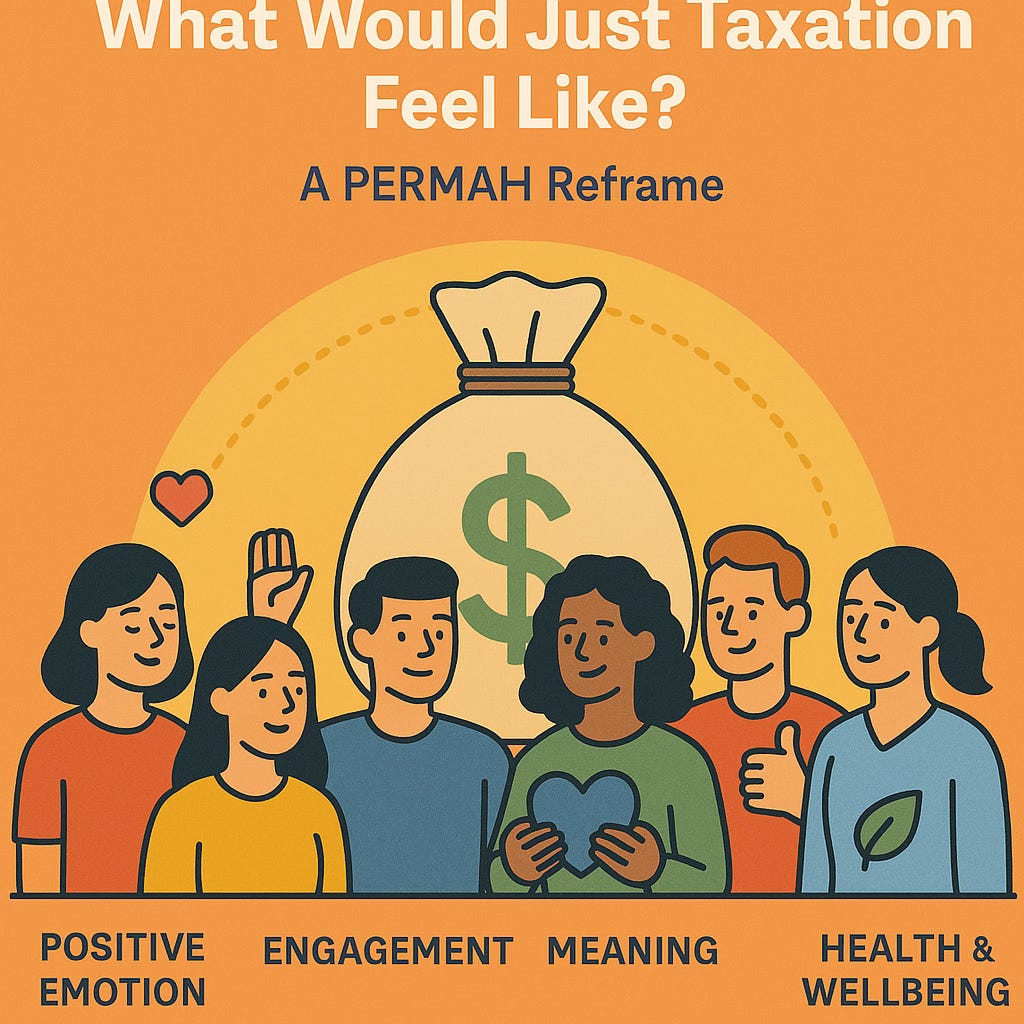What Would Just Taxation Feel Like? A PERMAH Reframe
When Contribution Feels Like Care: Rethinking Taxation for Human Flourishing
"Taxation is the price we pay for civilization." – Oliver Wendell Holmes Jr.
But what if that price also bought us something deeply human?
From the THX Series Hub: Government That Works
Reimagining Taxes: Not Just a Cost, But a Contribution
Throughout history, people have gone to extraordinary lengths to avoid taxes—from building homes without closets in England to bricking up windows in France. These clever evasions are more than economic tactics; they reveal a deeper human truth: we resist systems that feel unfair, impersonal, or extractive.
But what if we designed a tax system that people wanted to participate in? One that delivered not only public goods but also personal and emotional benefits?
Using the PERMAH framework from positive psychology, let's explore what just taxation could feel like if it were aligned with human flourishing.
P – Positive Emotion: Turning Payment Into Purpose
People feel better when they know their money is being used well. Just taxation should inspire positive emotions: pride, joy, even hope. These feelings arise when contributions are clearly linked to visible good—like safe playgrounds, educated children, or clean drinking water.
Imagine receiving a message from your city that says:
"Thanks to your contribution this year, 3 new teachers have been hired in your district."
Instead of resentment, there's a sense of uplift. Instead of faceless forms, there's human connection.
E – Engagement: A System You Help Shape
People are more willing to contribute when they feel involved. Engagement happens when taxation is not just a demand but an invitation to participate. What if citizens could vote on where a small percentage of their taxes went each year—mental health programs, green spaces, local arts?
Imagine an interactive dashboard where you track not only what you pay, but what it fuels.
Engagement replaces cynicism with curiosity. It transforms resentment into relevance.
R – Relationships: Building Trust Through Equity
Trust is the currency of community. When taxation feels rigged—benefiting the powerful while burdening the vulnerable—social bonds fray. But when a tax system is seen as fair and compassionate, it can actually strengthen relationships among citizens.
When we know our neighbors are benefiting fairly, we are more likely to trust, help, and collaborate. Just taxation builds what economists call "social capital," and what humans call belonging.
M – Meaning: Connecting to a Greater Purpose
Taxes are more than transactions. They are moral expressions of what we believe society should provide: safety, education, opportunity, care. When people understand the deeper meaning behind their contribution, they're more likely to give with a full heart.
Imagine your tax return including an "Impact Statement" showing how your funds helped veterans, clean water initiatives, or early childhood programs.
Meaning transforms taxation from a necessary evil into a purposeful act.
A – Achievement: Celebrating Civic Contribution
People want to feel like they’re making progress. Achievement is often missing from the tax conversation. But what if civic contribution was something to be proud of—tracked, recognized, even celebrated?
"You’ve helped 2 students attend public college!"
"Your contributions over the past 10 years funded 5 miles of local road repair."
Just taxation would allow us to feel a sense of accomplishment for showing up, year after year, as contributors to a greater whole.
H – Health & Wellbeing: From Survival to Thriving
A just tax system ensures not only survival, but access to healthcare, mental health support, clean environments, and disaster relief. These are not luxuries—they are the building blocks of a society where all can thrive.
When taxation supports whole-person wellbeing, it becomes a form of collective care. It shifts from scarcity management to investment in resilience.
Final Reflection: From Compliance to Contribution
Just taxation, when seen through the PERMAH lens, isn’t about making us feel good to silence dissent. It’s about aligning financial systems with human needs, values, and emotional truths.
It makes visible what has long been invisible: that when we contribute to each other, we are contributing to ourselves. That belonging is built not just on what we share, but on how we share it.
Your Turn:
What would make paying taxes feel meaningful to you? Can you remember a time you saw your tax dollars at work? What would you change to make our shared investment system more just?
Join the conversation. Let’s reimagine the future together.
THX: Transform the Human Experience
Because flourishing isn’t just personal. It’s structural.

Interpretation:
This image captures the heart of a reimagined tax system—one grounded in human flourishing, not fear or frustration. Each individual around the shared fund represents one dimension of PERMAH, turning taxation into a symbolic and actual act of care. The circular composition speaks to mutual responsibility. The colors reflect warmth, dignity, and renewal.
In this vision, paying taxes isn’t a loss—it’s a meaningful act of belonging.




What would make paying taxes feel meaningful to you?
Can you remember a time you saw your tax dollars at work?
What would you change to make our shared investment system more just?